Peter MALONE
Saturday, 18 September 2021 19:33
Dragon: The Bruce Lee Story
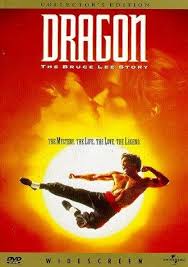
DRAGON: THE BRUCE LEE STORY
US, 1993, 120 minutes, Colour.
Jason Scott Lee, Lauren Holly, Robert Wagner, Michael Learned, Nancy Kwan.
Directed by Rob Cohen.
Dragon: The Bruce Lee Story was co-written and directed by Rob Cohen and based on Linda Lee Cadwell's biography of her husband, Bruce Lee: The Man Only I Knew.
The film focuses on the legend of Lee, introduces us to him as a boy in Hong Kong, the dangers of living in Hong Kong and his having to move to the United States, his father's anguish at his older son's death and his fear of demons destroying his younger son. The film shows Lee settling in America, experiencing racism, dating and marrying Linda, the birth of his son Brandon. It also shows him establishing martial arts classes for non-Chinese - and the antagonism of the Californian Chinese community. Ridiculed for his methods at a Long beach tournament, he overcomes prejudice and establishes himself, also being invited to Hollywood to star in the television series, The Green Hornet (though still the victim of racism). While he loses the role in Kung Fu to David Carradine, he starts on a movie career, especially with success in Asia with The Big Boss. However, the demons continue to torment him, he is workaholic, there are tensions with Linda and Brandon, he makes such films as Enter the Dragon - and suddenly dies.
Critics considered the film a glossy portrait of Lee, avoiding the complexities - and considered it as a `print the legend' biography. Jason Scott Lee (Map of the Human Heart) gives an energetic and sympathetic performance as Lee. Lauren Holly is his wife, Robert Wagner is the television producer. The supporting cast includes Nancy Kwan as the owner of a cafe and Cohen himself portrays Robert Klaus, the director of Enter the Dragon (the hall of mirrors sequence of this film is reproduced).
1. The Bruce Lee story, reality, the legends, the focus on his martial arts career, the media? His son (and the pathos of his son being killed on a film set prior to the film's release)?
2. The Hong Kong settings, California in the '60s and '70s, Thailand? The shadow side of Hong Kong? The martial arts sequences? TV and film studio and location work? The musical score?
3. The title, the focus, Bruce Lee's popularity in the '60s and '70s - and for decades afterwards?
4. Jason Scott Lee's impersonation and interpretation of Lee, sympathetic portrayal? Insights?
5. The opening, Hong Kong in 1949, Bruce's father, concern about his older son's death, wanting to protect Bruce from the demons, training him in martial arts?
6. The motif of the demon warrior appearing in vision throughout the film, the stages of the occurrence, portraying Bruce's inner fear, his need to conquer this fear or pass it on to his son? The visual style and action?
7. Bruce as a teenager in the 60s, getting into trouble, using his martial arts skills, the sailors accosting the women at the dance hall, his fight? His having to move out of Hong Kong - and the implications of sinister powers and influence in Hong Kong? His injury, his father giving him his American birth certificate and money to go to the United States?
8. Life in the United States, San Francisco and California? Dishwashing at Gussy Yang's, attraction to the waitress, in trouble, the fights, his having to leave, Gussy giving him the loan for his education?
9. His college experience, the racist taunts, his ability in fighting, leading to admiration, the white students learning the martial arts, Linda attracted and working with him, studying, the dates? His establishing a number of institutions and their development? The irony of going to Breakfast at Tiffany's - and the caricature of Mickey Rooney's Asian portrait?
10. The development of the martial arts, the stunt work, his own particular style, his schools?
11. Oakland and the clash with the Chinese, the issue of training the non-Chinese? The bout, the clash with Johnny Sun and his being crippled, convalescing, dictating his book to Linda? The convention at Long beach, the personnel present, his being booed, offering the challenge, the clash with Johnny Sun and the injury to him, Lee winning?
12. Hollywood and its invitations? Bill Krieger and his style, the preparation for The Green Hornet, the picture of filming part of the series? The action adventure - Hollywood's version of Orientals and Lee not allowed to take off his mask? His not getting the role in Kung Fu - and watching it on television?
13. His disappointment, going to Hong Kong, relationship with Linda and his son? Going to the movies, being busy, tension? The hostility in Hong Kong?
14. In Thailand, Luke, Johnny Sun's brother fighting him, the fight on the movie set, the camera rolling? The injury and death? The film of The Big Boss - and its premiere, great success and Lee becoming a cinema hero?
15. The developing conflicts, alienation from Linda, the filming of Enter the Dragon (and the mirrors sequence)? The appearance of the warrior? The suddenness and untimeliness of his death?
16. The character of Linda, her perspective on Bruce Lee, justifying herself and her marriage? Her son?
17. The portrait of the American media, exploiting Lee? Television and film? The character of Bill Krieger?
18. Truth and fiction? `Print the legend'?
Published in Movie Reviews
Published in
Movie Reviews
Tagged under
Saturday, 18 September 2021 19:33
Dragnet
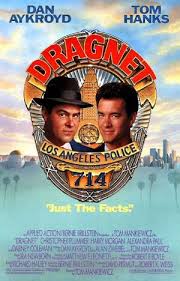
DRAGNET
US, 1987, 106 minutes, Colour.
Tom Hanks, Dan Aykroyd, Christopher Plummer, Elizabeth Ashley, Harry Morgan, Alexandra Paul, Dabney Coleman.
Directed by Tom Mankiewicz.
Dragnet is a 1980s homage and spoof of the earlier '50s films and the television series. A Los Angeles police department took itself very seriously in Dragnet days. It still does, though there are oddballs on the force.
The film works fairly well as a police action thriller with comic touches. It is quite watchable. Whether the satire on the LAPD and the original series is as effective is another matter.
Dan Aykroyd is very good as Sergeant Joe Friday, the nephew of the original. He offers the deadpan interpretation of the policeman, working by the book. (This is all parodied in the Police Academy series.) By contrast, Tom Hanks offers his usual genial style as an officer who is not so hidebound by the rules.
Christopher Plummer does a guest role as one of the most smarmy of television evangelists - who is corrupt and ambitious. Elizabeth Ashley is the police commissioner. Harry Morgan has a guest role as Lieutenant Gannon. Alexandra Paul is an attractive heroine.
The film combines social comment about a Hugh Hefner type of tycoon and the double standards of the tele-evangelists as well as police corruption. Direction is by the writer Tom Mankiewicz. (And there are spoofs and humorous comments on many other films.)
1. A popular film, homage to the original series? Spoof? '80s style?
2. The streets of Los Angeles, the use of the city? The mansion, the car chases, the observatory? An authentic feel?
3. The stunt work, the car chases, the shootouts? The musical score - and the original theme? The humorous references to other movies and stars?
4. The LAPD, the credits, the badge, the voice-over, the comments about the city, the change from the '50s, the rules and the by-laws? Times and places with accuracy?
5. Dan Aykroyd's portrait of Joe Friday: his dress, speech, the voice-over, times and places, with his work, his meeting Pep, ordering him to change, with Lt. Gannon? The episode in the zoo and the stealing of the animals, going to Caesar's mansion and the presence of the girls, his matter-of-fact observations? Watching the television show and his admiration for the Reverend Whirley? Reading his magazines? The visit to the landlady and her vulgar language? Finding Emil Muzz, the chase and Pep's violation of the road rules? The interrogation of Emil, his smile at the torture? The punk disguise, the PAGAN meeting, the virgin Connie Swayle and their diving into the water? Trying to explain to Gannon in the early hours? The commissioner and everything disappeared? The car explosion, going to the strip joint for coffee, his moral observations? Encountering the gang on the street and defeating them? The raid on the milk factory? Taking his granny out for dinner, Connie and her testifying against Whirley, his arresting him, having to hand over his badge and gun? Alone with Connie, the car being overturned by Emil? Prisoner in the observatory, having to wait outside the party? The raid, his getting his badge back, the arrest? The car chase to the airport, the plane and his downing Reverend Whirley? The happy ending - with Connie Swayle?
6. Pep and his undercover style, Tom Hanks and his comic manner, wisecracks and observations, at the zoo, knowing the girls at Caesar's, the driving, the torturing of Emil with the drawer, the punk disguise, diving in to rescue Connie, fighting with the snake? Explanations to Gannon, the commissioner? His girlfriend? The strip joint, invading the milk factory and his mistake? Watching the television in the car? Out with Granny, on the back of the bike? The appeal to Gannon for Friday? His imitating his severe manner? Going to Muscle Beach, finding Emil, his advice to Joe not to join the raid? The final raid and the arrests? The happy ending? The discussion on friendship and calling him by his first name?
7. Caesar and the parody of Hugh Hefner, the mansion, the sex and the girls, his going to the meeting with Whirley, the plan, the party, his being rescued?
8. Reverend Whirley and his smarmy style, Los Angeles as the porn capital, his presence at the PAGANs and his being their leader, his speech about Caesar? Public denunciations? Speech with the mayor? The dinner with the commissioner and Gannon? His arrest and his antagonism? At Caesar's mansion, the cheque, leaving, his conspiracy for the gas, burning Caesar's mansion? The explosions, the chase to the airport, leaving the commissioner behind, taking Connie? His being downed by Friday? The finale and his sentences - and quick parole possibilities?
9. The commissioner, her relationship with Whirley, threatening Friday, her speech against the mayor, her planning, being left behind?
10. The PAGAN meeting: People Against Goodness And Normalcy? The goats, the dance, the rally, the virgin? Leaving their card? The robberies, the sacrifice, the conspiracy?
11. Connie, the virgin, into the pool, being rescued, in love with Friday, the evidence against Whirley, Friday losing his job, kidnapped again, happy reconciliation?
12. Gannon and the police force, his belief in Friday and Pep? Emil and his violence, the bogus cops at the PAGAN meeting, the landlady and her foul mouth?
13. The deadpan humour, the wisecracks, the spoof? Enjoyable action comedy?
Published in Movie Reviews
Published in
Movie Reviews
Tagged under
Saturday, 18 September 2021 19:33
Dracula's Widow

DRACULA'S WIDOW
US, 1988, 85 minutes, Colour.
Lenny Van Dohlen, Sylvia Krystel, Josef Sommer.
Directed by Christopher Coppola.
Dracula's Widow is a small-budget light exploitation film - capitalising on the popularity of vampires as well as the familiarity with the Dracula story, as well as doing some send-ups.
Lennie van Dohlen (Electric Dreams) runs a museum in Hollywood and imports material for a Dracula exhibition, including the dead wife of Dracula, played by Sylvia Kristel. (Sylvia Kristel is overdressed in the film, wearing the same suit all the time - only appearing to disadvantage with the make-up experts get to her and she is in need of blood and in a fury against her enemies.) Josef Sommer takes time off from his serious portrayals to portray a stereotyped Los Angeles detective.
The familiar ingredients are there: Dracula's widow arising during the night, drawing blood from her victims, killing people - especially a group of Satanists in Los Angeles. the caretaker is an expert on horror material, with posters and watching horror films, taken to be her slave - but fortunately rescued at the end. His girlfriend, Jenny Harker, remains faithful to him. There are various assorted characters in the museum as well as portrayals of smug police officers and detectives.
Nothing particularly new but quite competently done.
1. The popularity of vampire films? Audience familiarity with the Dracula story?
2. Los Angeles settings, stylish photography? Special effects and make-up? Musical score?
3. The title and the focus on Dracula's widow, Sylvia Kristel in the role? Transported to Los Angeles, waking up, Raymond as her victim and slave? Her killing the man in the bar, the Satanists? Her turning into a monster? Stalking the night, Raymond's betrayal, her eventual death?
4. Raymond and his museum, encountering Dracula's widow, being bitten, serving her? His relationship with Jenny? Watching Dracula's widow in action? The police? The final dilemma and his destroying Dracula's widow?
5. The police inspector, the stereotype of the detective, his investigations? The authorities?
6. The various minor characters - the robbers in the museum and their destruction? The people of Los Angeles?
7. Van Helsing's grandson, the confrontation with Dracula's widow, his being vampyrised?
8. Serious treatment of the themes? Blended with spoof and send-up?
Published in Movie Reviews
Published in
Movie Reviews
Tagged under
Saturday, 18 September 2021 19:33
Down to Earth
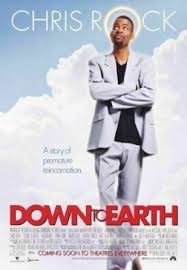
DOWN TO EARTH
USA, 2001, 86 minutes, Colour.
Chris Rock, Regina King, Frankie Raison, Chas Palmentieri, Eugene Levy.
Directed by Chris Weitz and Paul Weitz.
Chris Rock is an African American stand up comic who has made a successful entry into the movies. He was the 13th apostle in Dogma and then Morgan Freeman's hit man son in Nurse Betty. Here he has his own show and he makes the most of it.
It is one of those comedies where the hero dies, goes to heaven and finds they have made a mistake, so he gets a temporary body until they find a permanent body for him. In fact, it is based on Warren Beatty and Elaine May's screenplay for Beatty's 1978 comedy, Heaven Can Wait. This, in turn, was based on a 40s comedy, Here Comes Mr Jordan. Mr Jordan was a boxer, Mr Beatty was a footballer and Mr Rock is a would-be stand up comedian.
Rock has a genial screen presence and a gift for patter. Where the film makes its points about race is that his temporary body is that of a 53 year old white tycoon who is making money out of people's misery by making the hospitals he owns exclusive. This gives Rock a platform for social reform, for falling in love with the attractive activist and for getting a final place in the concert that will be the last for Harlem's Apollo theatre. Regina King is the romantic interest and health campaigner. Chazz Palmentieri is Mr King who manages entry into heaven on God's behalf. Eugene Levy has good moments as the sometimes inefficient heavenly accountant.
1. Entertaining comedy? The touch of the supernatural? People being given a second chance?
2. The film based on Heaven Can Wait and the adaptation to the African- American scene? Simplifying the plot, simplifying the issues, adapting them to Chris Rock's talent as a stand-up comedian?
3. The city locations, New York, Harlem, the Apollo Club? The contrast with affluent New York and the apartments and golf courses? The scenes of Heaven - and imagining Mr King and his entourage?
4. The special effects - the angels, the deaths, survival? The supernatural touch?
5. The musical score, songs, rap, hip-hop, traditional music?
6. The focus on Lance: the opening and his pretending not to be a black messenger? His attempt to do stand-up comedy at the Apollo and his being booed? His friendship with his manager? His death? The encounter with the accounting angel, going to Heaven, his resistance, meeting Mr King, the accountant having made a mistake, his being allowed back in a temporary body?
7. His becoming Charles Wellington - and the irony of our seeing him as Chris Rock and the people in real life seeing him as a 54-year old large white man (and the scenes where Wellington was shown singing, jiving, hip-hop, stand-up comedy)? His adapting to the situation - in the house, finding that the body was in the bath and the wife and lover had killed him? Confronting them? Meeting the butler, Cisco, and discovering that he was not English? Wanda and the maids? Everybody's resentment towards Wellington, tycoon, treatment of hospitals? His relying on his 2IC and the board?
8. Sontee and her invasion of Wellington's house, the handcuffs? The encounter with Lance and her puzzlement? His going to the hospital and his being attracted to her, the stand-up comedy at the board and their bewilderment, his urging charity and kindness? His becoming friends with Sontee, the ninety phone calls, the messages around the city, finally cornering her and inviting her out to a meal? The phrases he used - that she would remember when he was no longer Lance?
9. The board, their greed, the plan to kill Wellington, the young man and his relationship with Wellington's wife, their blaming him? The wife, her liking the sadistic touches? Wanting to go back to her husband, the sexual attraction and Lance telling her that he wanted a divorce? The charity function and all the board serving out the food, Lance talking to Sontee and telling her to remember him, her always talking about his eyes as if someone else was inside Wellington's body? His being shot?
10. His friendship with his manager, seeking him out, revealing himself, practising his stand-up comedy, friendship with the servants and going to their television room, performing in front of them, buying the club, being ridiculed at first, being successful, fulfilling Lance's ambition to play on the last night of the Apollo?
11. Mr King and the angel and their characters, their presence at his performance, warning him about death, his being shot, his being in the car crash? His becoming the comedian and his being successful at the Apollo? His manager supporting him? The explanation that he would become the comedian, forget everything and people would forget him?
12. The encounter with Sontee, with his manager, his not recognising them? But his wanting to take on the old manager as his own, thinking that he had met Sontee before? The finale with Wanda, Cisco, Sontee and Lance in his new persona in the car (and the humorous echo of when he was attacked while singing hip-hop in the diner by African-Americans? who thought he was mocking them)?
13. A pleasant comedy, what if...?
Published in Movie Reviews
Published in
Movie Reviews
Tagged under
Saturday, 18 September 2021 19:33
Down Three Dark Streets
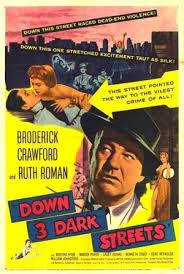
DOWN THREE DARK STREETS
US, 1954, 85 minutes, Black and white.
Broderick Crawford, Ruth Roman, Martha Hyer, Marisa Pavan, Casey Adams, Kenneth Tobey.
Directed by Arnold Laven.
Down Three Dark Streets is a competent FBI study of the early '50s. In later decades, of course, this would have been material for episodes of a television series. However, in the early and mid-'50s it was material for a black and white B feature. The cast is competent, including Oscar-winner Broderick Crawford with Ruth Roman. In support are a number of stars who were to emerge later in the '50s or on television - including Martha Hyer, Claude Akins.
The film focuses on three interconnected stories, has the usual voice-over praising the work and competence of the FBI, with a melodramatic conclusion - with faith in the FBI and things American. Direction is by Arnold Laven, who was to direct a number of action features in the '60s and early '70s.
1. Entertaining FBI story? Semi-documentary style?
2. Black and white photography, California settings? Los Angeles? The world of the FBI and its officers? Au authentic atmosphere?
3. The title, the three different stories and their interconnection? The FBI, its place in American society, American security? The voice-over praising the FBI and explaining its procedures, techniques, personnel?
4. Stewart and the initial investigations, the three cases: the gangster and the shoot-out on the road to California, the extortionist and his telephoning Kate, Angelino and the stealing of cars? The investigations, his dedication, the sentiment about his family, the murder? The FBI and the urgency of the investigation?
5. Ripley, his skills, the investigation, questioning, lab work, interviews with Kate, the meetings with the semantics professor, on the road? The stakeout and the final shoot-outs? Competent FBI official? The portrayal of the other FBI personnel, investigators, lab technicians, professors?
6. The gangster story: his shooting the garage attendant, his girlfriend, the FBI interrogating her, her glamorous style, coming from nothing, being kept, the gifts? Her disdain of the officials? Their playing on her emotions, telling her that her boyfriend had another woman? Her jealousy, driving, trying to elude pursuers, meeting with the gangster, the stakeout, the shoot-out and his death?
7. The Angelino story - the stolen car racket, his arrest, going to prison, his wife, the interrogations, the emergence of her blindness, sympathetic character, love for her husband? The boxer and his attacking her? Her ability to get a description and convey it to the police? The tracking down of the boxer, the interrogation, confronting him with Angelino, the story about the attack on his wife? The confession, the arrests? The reconciliation?
8. Kate and her daughter, the death of her husband and the insurance? Her professional work? The phone call, getting in touch with the FBI? Her housekeeper and care of the daughter? The uncle and his gambling? The neighbour and his need for money? David and his friendship, the date, drinking, her rejection of him? The gift of the bicycle, at the party? Suspicious characters for the extortion? Her keeping the appointments? The FBI monitoring her phone, surveillance, the suspects? The birthday party and the recordings, the semantics? Fingerprints on the glasses? The pinpointing of the extortionist? His phone call, Kate following the directions, on the Hollywood sign, the confrontation and the truth? (And audiences being suspicious of him, anyhow?)
9. The resolution of the cases? Interesting in themselves? As a B-film of the '50s?
Published in Movie Reviews
Published in
Movie Reviews
Tagged under
Saturday, 18 September 2021 19:33
Double Jeopardy
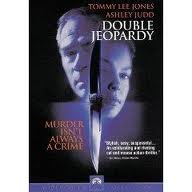
DOUBLE JEOPARDY
US, 1999, 105 minutes, Colour.
Tommy Lee Jones, Ashley Judd, Bruce Greenwood, Anna Beth Gish.
Directed by Bruce Beresford.
Double Jeopardy is an enjoyable, slick and glossy thriller, the airport bookstore kind of thriller. It focuses on a happily married woman who turns out to be the victim of a callous conman husband and her best friend. She is framed for murder, condemned to prison, serves her sentence for six years. While in prison she hears information about double jeopardy - the possibility of actually killing someone of whom she was accused of killing but didn't. On release from prison, she is under parole supervision by Tommy Lee Jones and escapes to pursue her husband. He follows her. The film then is a chase thriller, the confrontation of the wife with her husband. It has colourful locations from the west coast to New Orleans.
Ashley Judd is convincing as the wronged wife. She appeared in such films as Heat, Kiss the Girls, Eye of the Beholder.
1. Popular and entertaining thriller? Plausible? Melodramatic?
2. The title, the explanation of the law, the motivation for Libby and her pursuit of her husband?
3. The Seattle and north-western locations, the town, homes, the water? The contrast with the prison? The world of the city? The contrast with New Orleans? The musical score and the accompanying songs?
4. The set-up, the affluent life, Nick and his financial difficulties, the fundraiser and society present? Libby and her enjoyment of this, her love for Matt? Angela and her friendship? The school?
5. The gift of the yacht, on the sea, the sexual relationship, Libby waking up, the blood, the knife, the police arresting her?
6. Libby and her reaction, not wanting to be arrested in front of her son, her lawyer and his support, the refusal of bail, the court proceedings, the attack of the prosecutor, her declaration of innocence? Found guilty? Sentenced to prison?
7. In prison, the two women and their taunts, their growth in friendship, the former lawyer and her giving advice about double jeopardy, the black prisoner and her friendship, the birthday cake for Matt? The collage of her life and work in the prison? Her exercise and becoming fit? The being primed for the parole board and her being let out?
8. Going to the city, the encounter with Travis? His own background, the accident, the wife and daughter, his isolation? His toughness with the women? No second chances and sending the prostitute back to prison? Libby's reaction? Her going out, to work, the computer, the man trying to get a date and her telling him the truth and scaring him off? Trying to track down Angela?
9. Nick, his callous attitude, the hypocrisy with his wife, the disappearance? The $2,000,000 insurance? Angela and her friendship, adopting Matt? The disappearance, Libby tracking them down through the school and the information? Their disappearance? The character of Angela - and the irony of Nick finally murdering her?
10. Libby and her escape, going to the school, the principal and the refusal of information, the break-in, pursued by the police? Travis coming, the handcuffs, on the ferry, the cars? Her manoeuvres to get free, the boat going overboard, Travis unlocking the handcuffs, her getting the gun, her escape?
11. Her information about Angela? Going to her mother and getting the financial support, the truck? The visit to Colorado, the art gallery and the Kandinskys (and the previous information)? Travis in pursuit, getting the same kind of information, going to New Orleans?
12. In New Orleans, Nick's change of name, his wealth, the hotel? Libby and her footwork, finding out the truth, her shrewdness in getting the dress on the rich woman's account? Going to the bachelor party, her participating in the auction, the confrontation with Nick? Her ultimatum about Matt? The irony of Travis finding Nick and warning him about the danger?
13. The meeting at the cemetery, the background of the funeral, the young boy paid to be Matt, her going into the mausoleum, Nick's attack, leaving her buried? Her shrewdness, the gun, breaking free, confronting him? Travis pursuing her through the rain, the help of the police, the barman and his helping her?
14. The final confrontation, Travis and finding her, her telling him the truth? The confrontation with Nick, taping the confession, the shots being fired, his death?
15. Libby going to find Matt, the reconciliation, the future?
16. The elements of the thriller, the double jeopardy issue, a prison film, a road and pursuit film? The focus of the central character as the mother, the love for her son sustaining her through the injustice? The support of Travis?
Published in Movie Reviews
Published in
Movie Reviews
Tagged under
Saturday, 18 September 2021 19:33
Double Impact
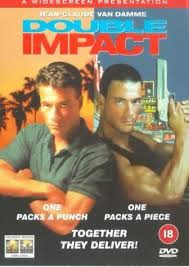
DOUBLE IMPACT
US, 1991, 105 minutes, Colour.
Jean- Claude Van Damme, Geoffrey Lewis.
Directed by Sheldon Letich.
Double Impact features Belgian martial arts champion Jean-Claude? van Damme. Van Damme made an impact in the late '80s with such films as Kick Boxer, Cyborg, Lionheart, Death Warrant. His next film is much bigger budget and more upmarket with Hollywood but mainly Hong Kong settings.
Van Damme is not only the star, he plays twin brothers. (He was also executive producer, co-writer of the screenplay with the director Sheldon Lettich as well as the originator of the story and the choreographer of the fights.)
The plot is familiar material - two babies separated at birth, growing up separately but meeting in order to avenge the deaths of their parents. The villains are English and Chinese. Van Damme makes a good attempt at differentiating the twins. Jeffrey Lewis is always reliable and is here as the mentor of the twins.
The film shows crime and violence in Hong Kong, martial arts battles, shoot-outs and explosions - the expected ingredients for this kind of action thriller.
1. Entertaining thriller? Crime? Hong Kong?
2. The Hong Kong settings, past and present, the vivid portrayal of the city, the hub, the islands?
3. Special effects and stunts? The choreography of the fights?
4. The work of Jean- Claude Van Damme - producer, writer, star, martial arts expert?
5. The prologue: Hong Kong, the opening of the Victoria tunnel, pomp and ceremony, the return home, the couple and their children, the pursuit and their brutal deaths? Frank and his injury? The glimpse of the villain? Rescuing the child? The nurse taking the child to the orphanage?
6. 25 years later: Hollywood, aerobics and glamour, Frank and his company, Chad and his training the women? His martial arts skills? The photos from Hong Kong, Frank and Chad going - in pink shorts with people's comments!
7. Alex, the encounter with Chad, Anne? The bar? People mistaking the twins? Chad and his Hollywood style? Alex and smuggling? The confrontation of the two? The information about their parents? The decision to collaborate?
8. Chad and his being taken in, bashed? Alex and the getting of revenge? The Chinese boss and the proposal for the smuggling? The group sabotaging and ruining the cargo? Anne and he spying in the firm, the lesbian bodyguard and her suspicions? Her searching Anne? Forcing Anne to contact the twins and so reveal the hideaway?
9. The hideaway, their staying there, preparing for the confrontation? Chad and his going to the city to rescue Anne, the violence and the chase? Alex and his drinking, jealousy, imagining the relationship? The confrontation between the two brothers?
10. The background of the villains: money deals, loans, smuggling, drugs? The Chinese boss and the triads? The gangs and thugs? The main thug and his fighting? The English businessman and his place in Hong Kong? The club, the bombs and the confrontation between the bosses and the twins?
11. The final set-up, the taking of Anne and Frank, torture on the boat? The twins going to the rescue? Tracking in the boat, the fights - the deaths of the principal villains including the woman? The chasing of the Chinese to the top of the crane - and his death? The crushing of Griffith?
12. The happy ending - atmosphere of crime, brutality, revenge, justice?
13. The popularity of the hero? This kind of action thriller? The popular plot, ingredients? The violent solutions to the problems?
Published in Movie Reviews
Published in
Movie Reviews
Tagged under
Saturday, 18 September 2021 19:33
Double-Crossed
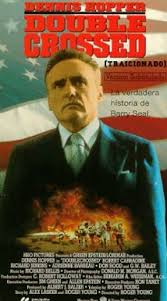
DOUBLE-CROSSED
US, 1991, 111 minutes, Colour.
Dennis Hopper, Robert Carradine, G.W.Bailey, Adrienne Barbeau.
Directed by Roger Young.
Double-Crossed is a telemovie for the home box-office network. It was directed by Roger Young, a veteran of this kind of telemovie.
The film offers a tour de force performance by Dennis Hopper as a manic pilot, smuggling drugs, arrested and then agreeing to work in photographing Central America for the CIA, his being double-crossed by the government and going to trial, his eventual death. Hopper gives his manic performance as usual but has more moments for quieter, more dramatic acting. The supporting cast includes Robert Carradine and Richard Jenkins as drug enforcement officers and G.W. Bailey as Hopper's friend. Adrienne Barbeau has a small role as Hopper's wife.
There are a lot of action sequences. There is also the excitement and exhilaration of Hopper's work as Barry Seary, a real-life pilot whose memory is vindicated by this film but who was ignored by the DEA and the CIA.
1. Interesting and entertaining telemovie? A portrait of an American drug-runner turned government man?
2. The title, the focus on Barry Seary, his drug-running, his turning for the CIA, the DEA and the CIA abandoning him in the courts and leading to his death? His role not being acknowledged in supplying surveillance material about the Contras and Nicaragua? The final images of President Reagan speaking?
3. Aerial photography, Central America, Louisiana? Action sequences? Latin- American jails? Washington? Musical score?
4. Dennis Hopper's screen presence and style as Barry Seary? The exhilaration of the flying? The arrests, the experiences in prison, his palling up with his associate and their work together? The drugs and his conscience? The arrest, the deal with Washington? Going to Miami and meeting Jim and David? The nervous reaction of them all? His decision to fly for the government, the photography of key areas of Central America? His arrest, the trials, the sentence? The vindictive judge? His relationship with his wife, children? The final surveillance with the Salvation Army? The tax people taking his furniture? In the abandoned home? David's visit? The assassination?
5. David and Jim, their work in drug enforcement, the encounters with Seary, the proposals, collaborating with him, his helping them? Their absence from the trials? Seary's death? Dave having visited Seary, wanting to go to the funeral, Jim forbidding him? Jim's final, the car? The comment on the agencies and their using people?
6. Seary's friend, meeting in prison, their collaboration, working together, his support, the trial? The lawyer and his dealings with Seary, friendship with him, manipulation and deals with the government? In the courtroom? The final court sequence and the double-cross and his reaction?
7. Seary's wife and children? Love, not knowing what he did, their support?
8. The film as an action thriller? Audiences agreeing with the court's comments on drug-runners? The value of the person who turns, does a deal, works for the government and contributes to national security? The critique of government agencies, their secrecy, their ability to use people and then discard them?
Published in Movie Reviews
Published in
Movie Reviews
Tagged under
Saturday, 18 September 2021 19:33
Don't Tell Her It's Me

DON'T TELL HER IT'S ME
US, 1990, 102 minutes, Colour.
Shelley Long, Steve Guttenberg, Jami Gertz, Kyle Mac Lachlan, Madchen Amick.
Directed by Malcolm Mowbray.
Don't Tell Her It's Me is a light and slight comedy, more of telemovie material. It was written by Sarah Bird from her novel, The Boyfriend School. It was directed by Malcolm Mowbray who directed the effective British satire A Private Function and directed the American black comedy, Out Cold. The film is a star vehicle for Shelley Long as an eccentric writer of women's novels, with Steve Gutenberg and Jami Gertz. It is a romantic comedy, a comedy of mistaken identities with a touch of farce (especially with Steve Gutenberg pretending to be a New Zealand bikie called Lobo).
1. Entertaining comedy, light and slight, romantic, farcical?
2. The Carolina settings, homes, workplaces? Musical score, the title song and its lyrics?
3. The title, the relationship between Gus and Emily? The original novel, The Boyfriend School?
4. Steve Gutenberg as Gus, Hodgkinson's Disease, the radiation treatment, the effect on him? His work as a cartoonist, his sense of humour, drawing style? His relationship with Lizzie? Relationships, his future? Lizzie and her books, her plans? His relationship with women? The date with Emily, the dinner, his failure to impress her? Lizzie transforming him into Lobo, the hunk, the bikie, the New Zealand accent? His comic style and pretence? The hold-up at the gas station and his bravery, saving Emily? Her response? Lizzie keeping him disguised? The relationship between Emily and Gus and Emily and Lobo? The spurning of Gus, the sexual relationship with Lobo? His telling her the truth, Emily's anger? His leaving for New York - and Emily's coming with him? The cartoon character and type?
5. Shelley Long as Lizzie, her style, humour, her books, her imagination? The interviews and her grand manner? The friendship with Emily? Relationship with Gus, wanting to help him? Her imagination, contrivance? Her own family and her reaction? The dinner, the failure? Her continued support of Gus?
6. Emily, at work, her relationship with Trout? Going to interview Lizzie, her reaction to the plots? Her coming to dinner, her attitude towards heroes? Politeness towards Gus, rejecting him? Attracted to Lobo, the rescue at the gas station, his continued attentions, riding with him? The sexual encounter? The discovery of the truth, her anger? Going back to Trout - the relationship with him, the break-off? Her anger? Realisation of the truth, leaving for New York with Gus?
7. Trout, the newspaper? His work, the relationship with Emily, his ambitions and style? His new girlfriend, her father? The break-off?
8. The background characters - in Lizzie's writing world, at the newspaper, Gus's friends?
9. Predictable comedy, enjoyable - with the touch of the cartoon?
Published in Movie Reviews
Published in
Movie Reviews
Tagged under
Saturday, 18 September 2021 19:32
Dominick and Eugene
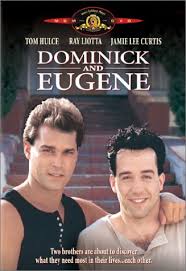
DOMINICK AND EUGENE
US, 1988, 104 minutes, Colour.
Tom Hulce, Ray Liotta, Jamie Lee Curtis, David Strathairn.
Directed by Robert M.Young.
Dominick and Eugene is a pleasing drama, set in Pittsburgh. It portrays two brothers, one who has suffered an accident in childhood and has a simple trustful approach to life; the other is an intense medical student. Nicky, played by Tom Hulce, is the gentle brother; Ray Liotta is the intense Eugene. Jamie Lee Curtis is Eugene's girlfriend, also a medical student.
The film is full of sentiment and strong American feeling. However, it has a strong, sometimes sharp, edge because of the performances of Hulce and Liotta. The film becomes somewhat melodramatic towards the end (perhaps American style). The film was directed by Robert M. Young (Short Eyes, Ballad of Gregorio Cortez, Extremities).
1. Enjoyable film? Humane? Emotion?
2. The Pittsburgh locations, the city, the homes? The credits sequences and the city? Places and streets? Musical score?
3. The introduction to each brother: the hospital work, at home, waking up? The sequence of the telling of the story, the memory? And their mother's grave? The bond between the two, their age, growth together, protection and care, financial situation, changes?
4. Tom Hulce's portrait of Nicky: at home, meals and work around the house, Eugene and his study? Larry and his friendship, at work, the stories, influence? Kindness? The boss? Mike and the comics? At the tip, friends, the pizza? Eating with Mrs Gianelli? The bonds with Gene? Not getting upset, responding to people, the drug deal? Jennifer and his reaction? Coffee? The picnic? Larry and the stories? The church and Father T? The birthday and his enjoying it, the pizza, the tickets, phone? The visit to Mrs Vinson with Larry? Dancing, drinking? The reaction about Jennifer, angers and hurt? Mike's story, his father? The realisation? The church and anger? The gun, running? The care with the baby, with Gene and coming down, the police? The truth about his father beating him? Being let go? Happy ending? The personal handicap, his personality?
5. Gene and his hospital work, the hours, at home, caring for Nicky? Kit, relationship with Larry? The drugs episode? Telling the story about their parents? The intimacy at home, the shower, bedroom? Studying with Jennifer? His love for her, inability to commit himself? At home, realisations about himself, his future, his own personality, angers? The meal? The birthday and the celebration? The build-up to Nicky's taking the child? Talking him down, telling the truth, his own fears about his violence? The decision to go to Stanford and study?
6. Jennifer, pleasant woman, relationship with Gene, studying, medicine, observing? The meal, picnic? The potential for jealousy? The ending?
7. Mike, his father, the attack, his death in hospital? the baby? Mike's father and his brutality? Nicky with the baby? Rescue?
8. Larry, friendship, type, the buddy, talk? His relationship with Mrs Vinson? Birthday? Sex talk, in action? Television? The end? Their work for Mr Johnson, his interest in the various men who worked for him?
9. Mrs Gianelli, friendship, meals, neighbourly? Her care for Nicky? Looking after him for the future? The church, Father T and his friendship and support?
10. A slice of American life, sentiment, hurt? Melodrama? Possibilities for the future?
Published in Movie Reviews
Published in
Movie Reviews
Tagged under